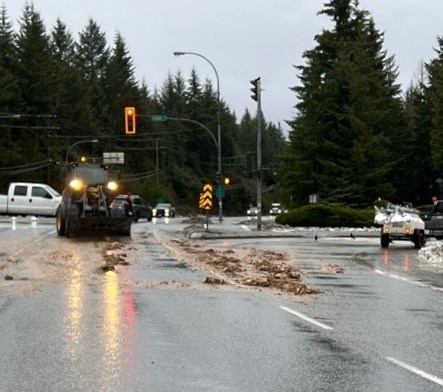Lu Wood was unfortunate enough to get caught behind the truck that spilled about 100 dead chickens onto Highway 99 in Whistler on Nov. 30 on its way to a composting facility in Pemberton.
“I full-on vomited. It was disgusting,” she said of the smell.
It’s an odour the Pemberton resident encountered again the following day, and nearly every day since, on her commute to and from Whistler for work.
“The severity of it comes and goes but it’s still always there,” she said.
Originally reported by police as dead turkeys following the late November spill, the truckloads of chicken carcasses were brought to Sea to Sky Soils at the request of the province after major flooding in the Fraser Valley drowned thousands of poultry and livestock. A spokesperson for Sea to Sky Soils said there were an estimated 30 truckloads received, the majority of the material being made up of wet woodchips, sawdust and chickens, which are reportedly nearing the end of their composting cycle.
B.C.’s Ministry of Agriculture said the remains from the floods were either composted, sent to landfill or rendering plants depending on their condition, and Sea to Sky Soils was one of eight different sites across the province used to manage the mortalities.
“We were asked to support the province during this state of emergency that [affected] so many—by processing a very small percentage of the hundreds of thousands of dead livestock on the valley floor,” wrote Sea to Sky Soils in a Facebook post on Feb. 11. “By accepting chickens (not turkeys) for composting, in an effort to lower the impact of the flooding, we were proud to be able to help our fellow citizens in a dire situation.”
The post went on to say that the facility wouldn’t normally accept “such difficult feedstock,” but with critical infrastructure like highways and other processing facilities around B.C. damaged in the flooding, the Ministry of Agriculture had few options.
The company said it is following the proper recycling protocols to turn the organic waste into nutrient-rich, Class A compost through an in-vessel composting process.
“There will be better days than others over the next few months and the odour will continue to improve as the material is moved through the system,” a spokesperson for Sea to Sky Soils said in a follow-up email.
The waste facility is also taking “stringent measures” to reduce the potential for attracting wildlife, the spokesperson said, pointing to the fencing in place as well as noise-makers used to prevent birds from accessing the site. The spokesperson noted there have only been two bear sightings on the property in the facility’s 10-plus years.
In an email, the Village of Pemberton (VOP) said it has not gotten any official complaints regarding the odour, but did receive two enquiries “relating to the matter,” which it has responded to. The email went on to say the livestock composting process at Sea to Sky Soils is in compliance with all applicable bylaws and provincial requirements. “We are also confident they have appropriate measures in place to monitor and manage wildlife,” the statement said.
Any facility inspection would be the responsibility of the ministry, which said in an email that “no formal concerns have been made to trigger an inspection” at this time.
Sea to Sky Soils has long been recognized for its positive environmental impact in the corridor, and was the recipient of the Whistler Chamber of Commerce’s 2019 Sustainability in Action award.
For Pembertonian Myson Effa, who raised the issue in a letter to the VOP this month, it’s not so much the odour that’s concerning, but the lack of messaging about the smell over more than two months.
“They’re trying to do their best, but there was just a vacuum—there was no information when this was going on,” he said. “I’m glad they did the social media post, but it doesn’t absolve the province, the health authority or the Village from providing this information or doing a proper inspection.”
The BC Chicken Growers Association reported that about 97 per cent of laying chickens survived the winter’s flooding. In an early December update, the Ministry of Agriculture reported that at least 640,000 animals were known to have died in the flooding, including 628,000 poultry.





